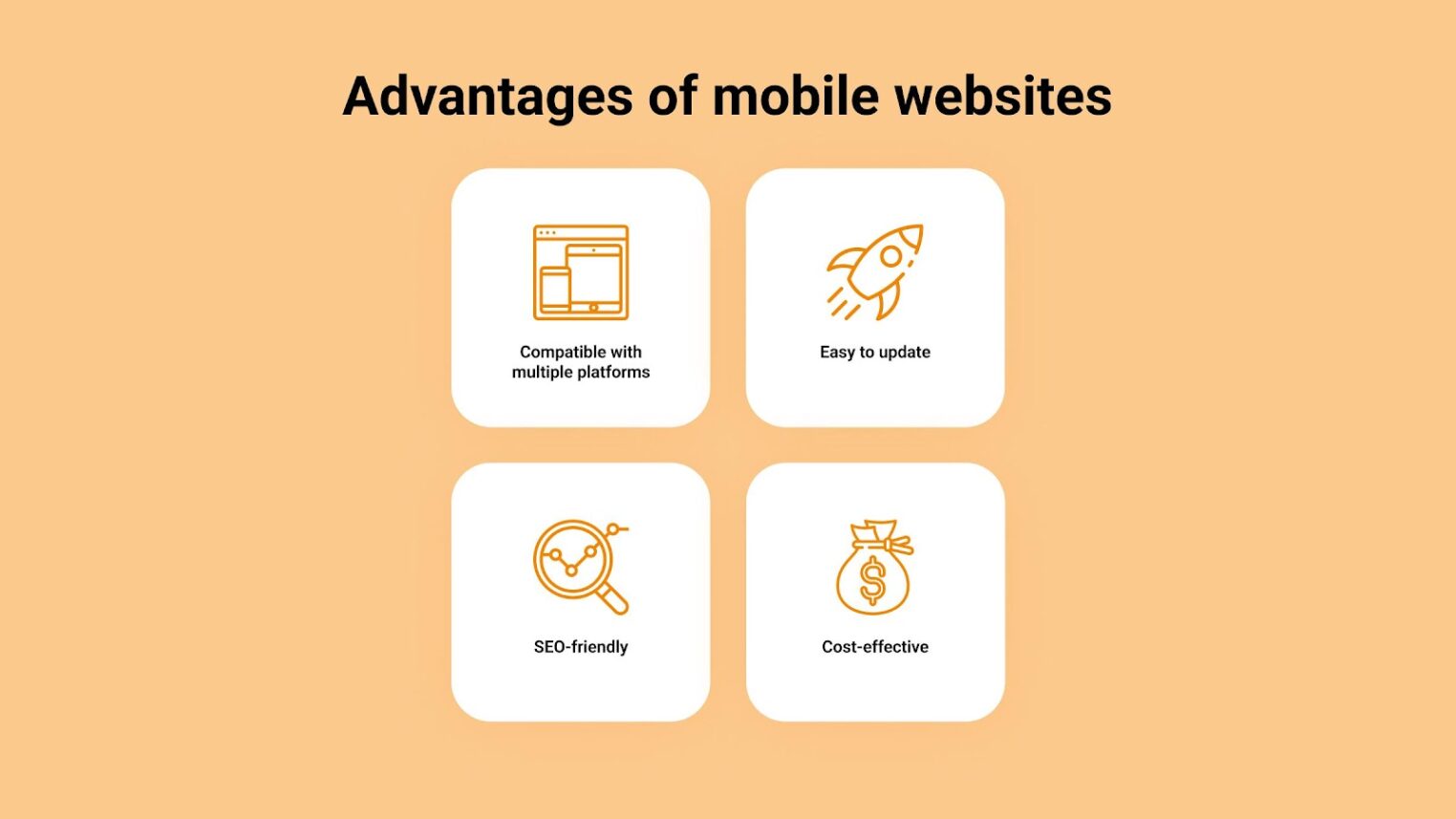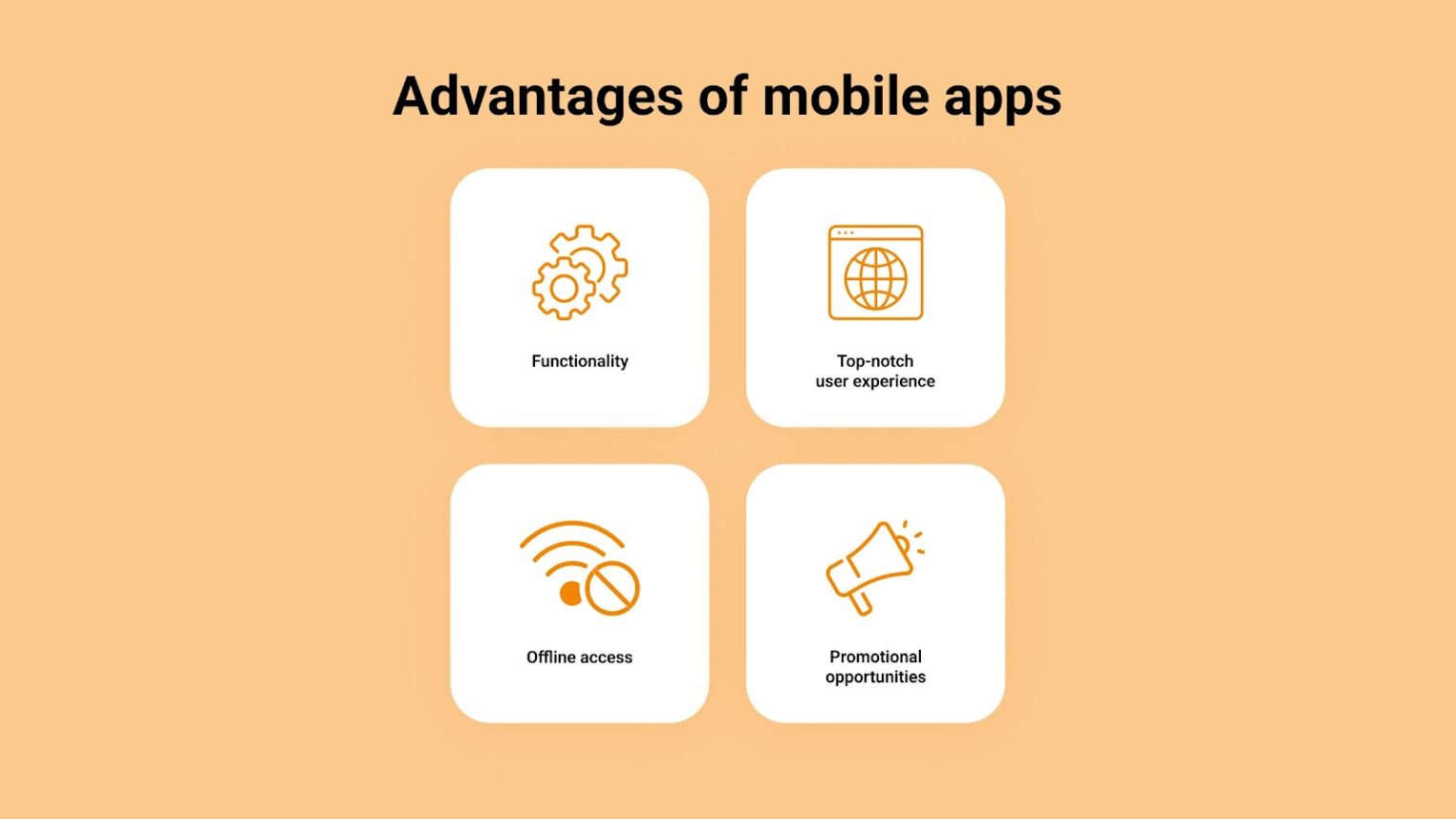“Do I need an app?” or “Can I just build a mobile website?” — these are the two questions entrepreneurs struggle to answer when launching their businesses. The central point in making this decision is price. Speed, stand-alone access, and maintenance also significantly contribute to decision-making. However, it can be challenging for C-level executives to consider all the aspects (especially at the start) who just want to connect with their target audience.
In this post, we’ll discuss each option separately and point out the advantages so you can define the fitting instrument for your business development.
Distinctiveness Between Application and Websites
Before delving into details, let’s briefly describe the essence of mobile websites and mobile apps.
Websites are the collection of multiple pages connected via the navigation menu. Mobile-friendly websites have responsive design as a rule. This means that it adapts itself depending on the size of the viewer’s location. Mobile websites are aimed to enable fast and straightforward access to content. Unlike mobile apps, users need broadband internet to power the site’s full potential. Moreover, customarily, deploying mobile websites requires less capital than creating a mobile platform.
Concurrently, mobile apps are interactive digital solutions that are made for specific platforms’ purposes — iOS and Android. Clients can easily upload the app on their smartphones or laptops using relevant app marketplaces. Likening websites and mobile apps, you can observe that apps exceed the sites in terms of usability, performance, and functional scope.
However, it varies on a case-by-case basis. Therefore, you need to conduct an in-depth analysis to define what option is acceptable for your business. Most enterprises like Amazon, Walmart, and Airbnb possess both a responsive site and a state-of-the-art mobile application suited to their unique business needs.
Essence of Mobile-Friendly Websites and Why Use Them
Mobile websites imply a simpler version of the company’s main site. It offers most of the same things as the primary business website but are made to perform well on smaller screens. Visitors can access the mobile-friendly site through mobile web browsers. And the content will be displayed correctly as they would use a full-size computer browser.
Mobile Website Development: When Businesses Need It
Various-sized businesses can make the most of mobile-friendly sites. For example, when the key objective is to establish a broad online presence, websites are the perfect way to do so. Moreover, it’s an affordable and quicker option. To comprehend whether you need a website, here are five check-questions to consider:
Do you want it to be SEO-optimized?
The majority of people begin product/service search through the Web. Mobile sites are easier to access to a broader group of people, thus, simplifying lead generation. The person enters a specific request to Google and runs into your platform through search outcomes. It assists organizations in acquiring more prospects and powering more traffic to the web page.
Are you looking for a low-priced solution to communicate with clients?
The cornerstone of all startups is how to acquire more customers with budget-friendly efforts. And mobile sites are adapted to this purpose since they allow for organic traffic growth. Moreover, developing a website will cost you less than, for example, cross-platform mobile app development. In addition, making a Flutter-based app demands specialists with relevant expertise. In comparison, responsive sites imply a unified codebase that operates across multiple browsers and screen sizes.
How often do you need to renew your content?
Before embarking on software development, you should study how frequently information upgrading is required. If you need to regularly renew the platform’s content — mobile websites win the “site vs. mobile app comparison” battle. This is because the users can access the new data once the developers upload the website to the server. In turn, native apps’ upgrades should go through a lengthy verification process to be available to the users. For example, it takes 2-3 days for iOS-based apps and 2-3 hours for Android ones.
Do you want it to be operable across numerous devices?
Mobile-friendly websites are specifically designed for mobile visitors and adapt all the site’s elements, including images, content, and navigations based on screen resolution. This will allow you to build a positive brand image and target more leads by delivering equally well experience across various groups of gadgets. Unlike mobile apps that demand a standalone version to be made for each platform.
Do you want to cut the cost of maintenance services?
By a reversal of logic, mobile apps require continuous maintenance and support to match ever-changing business objectives and create value in the long term. For example, if we talk about enterprise-level mobile applications like logistics or telemedicine, such solutions demand multi-layer support due to architecture complexity. Such actions may include legacy system modernization, testing, introducing new features, etc. In turn, supporting mobile websites will cost you less over time. It entails a set of services relating to content management, promotion, increased speed, backing up data, and so on.

Features of Mobile Apps and Their Importance for Businesses
More and more companies are investing in mobile app creation to increase sales and engage with customers on the go. Mobile apps are about taking customers’ attention to the product/services. They are designed to operate on small computing devices instead of desktop computers. Businesses across different domains tend to create mobile versions of their digital products to allow clients to take advantage of their software solutions. If you’re one of those who intend to create an app for your business, check the reasons to do so.
When Do Businesses Require Mobile Apps
You want to deliver a personally tailored experience
Suppose you want to provide a software solution to use regularly in a personalized manner (e.g., mobile banking, Instagram-like app). In that case, mobile app development is the right approach for this intent.
You want to provide services on demand
Applying ASAP SDK for mobile apps, you can smoothly link impatient and time-vulnerable customers to AI-based bots or service providers as requested. Or you can integrate an option to allow users to schedule a meeting with the service team at a suitable time.
You want to notify users about upcoming events
The ability to target advertisements is one of the reasons business owners choose mobile apps over websites. Such advertising can be carried out as push notifications. For instance, you can directly inform users about sell-nearby or limited-time offers. However, many web browsers support web-based push notifications, enabling the platform’s holder to transfer messages to customers who give their consent.
You’re seeking an effective brand marketing channel
Thera numerous means mobile apps support businesses. They can improve the on-brand experience, drive sales, keep customers involved, and enhance clients’ loyalty in this competitive landscape. Today companies are creating native applications to increase brand awareness, thus, enlarging the client base. Once users install your app, its icon is always noticed, leading to greater brand visibility. The more touch points between a company’s app and the client are, the sooner prospects decide to purchase its product.
You want to enable offline accessibility
Users may run into situations where the only wi-fi available is unsecure, they don’t have a password to access data, or there is no internet connection. Your clients can benefit from the product’s functionality by enabling offline mode. Unfortunately, this configuration doesn’t perform fittingly on mobile sites.

Native Apps vs. Websites Comparison: Main Criteria
While considering what development approach is better for your business, we’ve compiled the solid sides and restrictions of native apps and websites (based on a set of criteria). Let’s see.
Compatibility
Websites render correctly on multiple screen sizes. In turn, native apps should be adjusted to particular platforms.
Offline use
Users can’t utilize the websites’ serviceability to its fullest extent offline. In contrast, mobile solutions allow for feature operability in offline mode.
Coverage
Mobile-friendly sites make it easier to engage more clients since they encompass various gadgets. In turn, mobile apps are restricted to smartphone’ (tablets) users.
Convenience
Websites are less convenient in terms of content consumption since they can’t keep all the details within a single page. In contrast, mobile apps deliver exceptional experiences enabling faster information loading and notifications receiving.
Customization
Websites lack personalized settings. Meanwhile, native applications submit broad options for customization (e.g., push notifications, widgets).
Price and continuous support
Mobile-friendly sites are associated with lower deployment and maintenance prices. However, mobile app development implies high initial investment and more time/resources for functionality modernization. Before implementing the upgrade, each feature added should be checked by app marketplaces.
Summing Up
As you see, each option has its own opportunities and obstacles to consider. It’s not about which development approach is better; it’s which option is appropriate for your company according to your business plan, promotional strategies, and financial resources. Ideally, it’s better to come up with both solutions to deliver the best business outcomes. Moreover, there is no time for much consideration in the fast-paced business world. You can start with responsive site creation and forming a loyal user base. After that, you can deploy a corporate-based mobile app to bring added business value.




